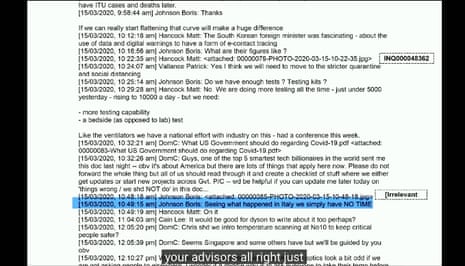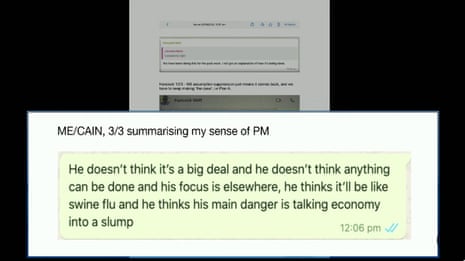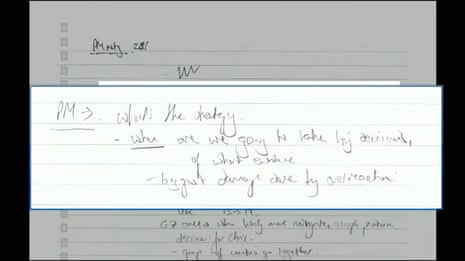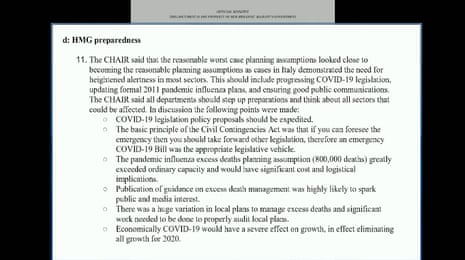Boris Johnson says he does not recall Hancock calling for immediate lockdown on 13 March – UK politics live | Politics
Johnson says he does not recall Hancock calling for immediate lockdown on 13 March, as he claims he did
Q: Over the weekend of 14-15 March 2020 there was a change of strategy. Some people like Dominic Cummings were pushing for change. You know about the likely impact on the NHS. Why wasn’t the Department of Health and Social Care pushing for a different approach? It was still pushing for the “squashing the sombrero, herd immunity” strategy?
Johnson says they knew at that point they had to act. They still thought they had “a bit of time”, and that was what the Sage paper from 12 March seemed to say.
The shift on 13 March was about timing, he says.
There was “a confluence of opinion”, he says. On Saturday 14 March he was talking to Prof Sir Chris Whitty and Sir Patrick Vallance.
By 13 March Sage had realised something needed to be done, he says.
Q: Until Cummings talked about plan B, no one at DHSC said a new approach was needed.
Johnson says the Sage meeting was where the view changed.
Q: Matt Hancock says he called you on Friday 13 March and said there should be an immediate lockdown. Do you recall that?
Johnson says he does not. It has been a long time, he says.
As the inquiry heard last week, there is no written evidence to support Hancock’s claim he made this call. Hancock did not even mention it in the book he wrote about the pandemic.
Key events
Johnson rejects claims he could not make up his mind about lockdown
Q: To what extent did you appreciate by the night of Sunday 15 March that a lockdown was essential. It was not imposed until Monday 23 March. And it was going to be technically complicated. Was it a) you deciding a lockdown was essential, but it would take; or b) you starting planning for one, but delaying the final decision to later.
Johnson says he was “increasingly reconciled” to the fact that he would have to do a huge amount more to suppress the virus.
The complications were enormous, he says.
His state of mind was – “I’m now more or less in virus fighting mode”.
Q: But you were not entirely like that? Here are messages showing that you were still opposed to lockdown. You would have been inhuman if you had not oscillated. But is it fair to say you made your oscillation clear to all around you.
Johnson says it was his job to consider all the implication and to “test the policy”.
These messages refer to a conversation with the chancellor where they considered the downsides.
It would have been “negligent” not to consider those factors, he says.
But this “did not in any way divert us from the crescendo of actions that we took”.
Q: This is a poor example of executive function. You could not make up your own mind.
Johnson objects. For the first time, almost, he seems to be getting angry. He had the chancellor with him, he says. He was told there was a risk to the UK bond markets. He had to go through the arguments.
Q: You talked at this time about the danger of killing everyone to save “bedblockers”.
Keith shows an extract from a note of a meeting.
Johnson says this was an indication of the cruelty of the decison he had to take.
If he said something like that, it was to illustrate the point.
The comment was not designed to broadcast, he says.
Johnson says he does not recall Hancock calling for immediate lockdown on 13 March, as he claims he did
Q: Over the weekend of 14-15 March 2020 there was a change of strategy. Some people like Dominic Cummings were pushing for change. You know about the likely impact on the NHS. Why wasn’t the Department of Health and Social Care pushing for a different approach? It was still pushing for the “squashing the sombrero, herd immunity” strategy?
Johnson says they knew at that point they had to act. They still thought they had “a bit of time”, and that was what the Sage paper from 12 March seemed to say.
The shift on 13 March was about timing, he says.
There was “a confluence of opinion”, he says. On Saturday 14 March he was talking to Prof Sir Chris Whitty and Sir Patrick Vallance.
By 13 March Sage had realised something needed to be done, he says.
Q: Until Cummings talked about plan B, no one at DHSC said a new approach was needed.
Johnson says the Sage meeting was where the view changed.
Q: Matt Hancock says he called you on Friday 13 March and said there should be an immediate lockdown. Do you recall that?
Johnson says he does not. It has been a long time, he says.
As the inquiry heard last week, there is no written evidence to support Hancock’s claim he made this call. Hancock did not even mention it in the book he wrote about the pandemic.
Johnson says, with hindsight, he thinks the government should have stopped mass sporting events in early March.
Q: But not doing so was in accordance with your own libertarian instincts?
Johnson says at every stage he was thinking of the impact on people. What the government was going to do was “very destructive for a lot of people least able to bear the costs”.
Keith shows a graph from a government paper from 12 March 2020. It shows that, even with measures in place, the NHS was going to be overwhelmed.
(The black line shows the number of NHS beds. Even in the graph showing the peak of the virus suppressed, as a result of interventions, there are more hospital cases than beds.)
Johnson says he was “bewildered” when he saw that chart. He says he “clocked” the danger. He goes on to say he thought “there must be a reason why we’re not being told to go urgently”.
He goes on:
I do remember looking at it and thinking there was something amiss.
Keith shows an exchange of messages from Sunday 15 March 2020 in which Johnson says they have “no time” given what was happening in Italy.

Johnson says on 12 March there was a press conference where he said a large number of people might die. It was “a pretty grim press conference”, he says.
He says they were asked about the way through. Sir Patrick Vallance said that they wanted to flatten the curve, with some measure of herd immunity a good outcome by the autumn. He says Vallance said it might not be necessary or desirable to stop everyone getting the virus.
Here is our live blog of that press conference.
He says at this point people thought the government wanted to let the virus spread unchecked.
That is not what the government wanted, he says. He says they had to do quite a lot of work to clear up that mess.
He says they hoped herd immunity would be “a byproduct” of what they were doing.
Keith shows a message from 5 March 2020 in which aides discuss telling Boris Johnson to stop saying it is “business as usual”.
Johnson says he does not remember that.
Keith asks if he understands that Sage was not able tell him what to do.
Johnson accepts that. It is like a doctor-patient relationship, he says. If you do this, this will happen, he says.
Johnson claims he had not been told to avoid shaking hands when he did so on hospital visit
Q: You shook hands with patients at a hospital on 1 March. Was that because you had not been advised not to shake hands?
Johnson claims he did not know about the advice, but he says in retrospect he should not have done that. But, he says, “I wanted to be encouraging to people.”
The inquiry hearing is resuming.
Hugo Keith KC, counsel for the inquiry, starts by showing a WhatsApp message that Dominic Cummings sent to Lee Cain on 3 March 2020.

Boris Johnson says by this point he was rattled by what was happening in Italy.
But he says the part of the message that is accurate is what it says about his fear about the impact of policies on the economy.
Q: If you said “I don’t think anything can be done”, that is significant.
Johnson says he cannot remember what he said to Cummings, and he says he “would not place too much reliance” on Cummings’ evidence.
But he could not see what the plan was, he says.
The NPIs (non-pharmaceutical interventions – lockdown-type measures, and other Covid rules) were “pretty far-fetched”, he says.

And here is a summary of some of the key points from this morning by Ben Quinn and Matthew Weaver.
Here is Peter Walker’s story about the evidence at the Covid inquiry this morning.
Johnson says he did not consider ignoring advice from scientists that locking down too soon would be mistake
Keith says Johnson chaired his first Cobra meeting on Covid on 2 March.
He was told then that test and trace would not work.
Q: Prof Sir Chris Whitty said at that meeting that interventions should not be imposed too early, to ensure maximum effectiveness. To what extent did this idea influence your decision making?
Johnson says it was “the prevailing view for a long time”.
It was not just Whitty. At a press conference on 12 March Sir Patrick Vallance also made the same argument, he says.
Q: To what extent do you think you would have introduced measures earlier if you had not been told this.
Johnson says this is “fundamental”.
They did lock down. But it bounced back after they lifted restrictions, he says.
Keith takes him back to the question.
Q: Would you have gone earlier? How long a delay did this cause?
Johnson says he does not think he would have gone earlier, because he would have been guided by the advice.
To do this was not something to rush into.
Q: Did you consider over-ruling the CMO, saying public health demands a lockdown, regardless of whether people will get tired of them.
Johnson says:
The short answer is no. Absolutely candidly, I don’t remember saying to myself: ‘This is so bad, they must be wrong, I must ignore the scientific advice and the threats to public health and have worse outcomes if we go too early’, and ‘I got to deal with the problem in front of the windscreen. I got to deal with it now’.
I didn’t do that, perhaps with hindsight, I should have done but, as I said to you right at the outset of this hearing, I just don’t know the answer.
And that is the end of the morning’s hearing. They are back at 1.40pm.
Party leaders row over Rwanda agreement at PMQs

Aletha Adu
Starmer asks Sunak about the Rwanda agreement, joking that the Conservatives would have been seen as making the “gimmick” a “resounding success” if its purpose was to “get people out of the country who simply couldn’t deal with … three home secretaries”.
Sunak hits back, claiming Starmer “doesn’t understand” that deterrence is critical, in order to “break the cycle”. He says the government will do everything it takes to get the scheme working and stop the boats, and resorts to accusing Starmer of finding himself on the side of the people smugglers.
Starmer again calls the scheme a “gimmick”, noting when the government first announced it, they vowed to settle thousands of people, which was reduced to hundreds. He asks how many refugees from Rwanda will be coming here to the UK under the treaty? Given no one from the UK has yet been sent …
Sunak responds questioning if Labour has a plan to address the problem, and then quips that Starmer’s plan would be to “cook up a deal with the EU that would see 100,000 illegal migrants trebled on his watch”.
Starmer asks how much the Rwanda deal has cost Britain in total given the scheme is capped at Rwanda’s capacity, and the east African country would be able to turn asylum seekers away if they wanted to.
Sunak says he’s been “crystal clear” there is no incremental money but invites Starmer to support the plan.
Starmer says the Rwanda scheme costs hundreds of millions of pounds with nothing in return. Referring to claims the home secretary, James Cleverly, called the plan “batshit”, Starmer said: “I am beginning to see why the home secretary said the Rwanda scheme was something to do with ‘bat’, I think, was it?”
Sunak said there is a simple question: “If you believe in stopping the boats, as we on this side of the house do, you need to have an effective deterrent and returns agreement. It is as simple as that.” He went on to criticise Labour MPs who campaigned to block deportation flights of foreign criminals, citing that as a reason Starmer doesn’t back the Rwanda plan
Meanwhile, the SNP Westminster leader, Stephen Flynn, asks Sunak if he’s worried that he’ll be the first Conservative party leader to lose a general election to a fellow Thatcherite, in reference to Starmer’s praise of the former Tory prime minister. He pits Labour and the Conservatives together based on their apparent stance on migration before asking why the prime minister thinks it’s acceptable to show “complete disregard” towards migrants.
Sunak replied: “It is important that those who come here contribute to our public services.”
Johnson says he recalls asking his advisers if the UK was facing a severe to mild flu, or pandemic, or something that would kill 500,000.
Keith shows an extract from a note from Imran Shafi, Johnson’s private secretary, in which he records Johnson warning about the danger of an over-reaction. This was on 28 February 2020.

Johnson says he was conscious of the potential costs.
Q: So, instead of getting the government to respond, you warned about the possible over-reaction?
Johnson says he was asking for a menu of options.
Q: Do you accept the “level of seriousness” was not sufficiently communicated by you?
Johnson says they had discussed borders, and he has been told there were ample supplies of PPE. They had also discussed NPIs (non-pharmaceutical interventions). But there was no concept of lockdown then.
Q: There was not a proper debate about what to do.
Johnson said people still did not think the RWCS was likely.
Johnson says he does not recall being told Cobra conclusion from 26 February 2020 mass deaths increasingly likely
Keith asks about Johnson being at Chevening at this period.
Johnson says he does not accept claims he was doing nothing.
He says he was working, including having calls with President Xi of China and President Trump.
Q: No one is suggesting you were on holiday.
Except you, says Johnson.
Keith says he was referring to evidence given by Dominic Cummings. Johnson apologises for attributing that view to Keith.
Johnson says the number of potential fatalities under the reasonable worst-case scenario (520,000) was horrific. He could not believe it.
Q: Do you accept there was a lost opportunity in government to react in that two-week period? It took its eye off the ball.
Johnson says there were things the government could and should have done if it had known how fast the virus was spreading.
Keith shows minutes from a Cobra meeting on 26 February saying the RWCS was becoming the central planning assumption.

Q: Were you told this?
Johnson says he does not remember this.
Rishi Sunak and Keir Starmer clash over Margaret Thatcher at prime minister’s questions

Aletha Adu
Rishi Sunak kicked off prime minister’s questions wishing the speaker, Lindsay Hoyle, a speedy recovery and offered condolences to the family and friends of Alistair Darling, Glenys Kinnock, and James Douglas-Hamilton, otherwise known as Lord Selkirk of Douglas, who “each made an enormous contribution to public life and will be deeply missed”.
The prime minister went on to apologise for the suffering of the Hillsborough families and said the government wouldl ensure their pain was not repeated.
Today ministers rejected the families’ call for a legally enforceable “duty of candour” but signed a charter to commit to transparency after public tragedies. Sunak said he hoped to meet the families in the new year.
Tory MP for Lichfield, Michael Fabricant, used a closed question to praise Margaret Thatcher and warmly welcome Keir Starmer to the “Thatcher fanclub”.
Sunak said he’s always delighted to welcome new Thatcherites from all sides of the house, but said it “says something” if the main “female and strong leader” Starmer could praise is Margaret Thatcher and not his own fantastic deputy, Angela Rayner.
The Labour MP for Rotherham, Sarah Champion, asked the prime minister how he could justify taking food from the poorest children in her constituency as in March the government is set to end the household support scheme, which could end about 12,000 free school meals for the poorest children.
Sunak said he was ensuring no child was growing up in poverty with the government’s cost of living support, and highlighted the government’s holiday activity and food programme, which only runs during the longest school holidays

